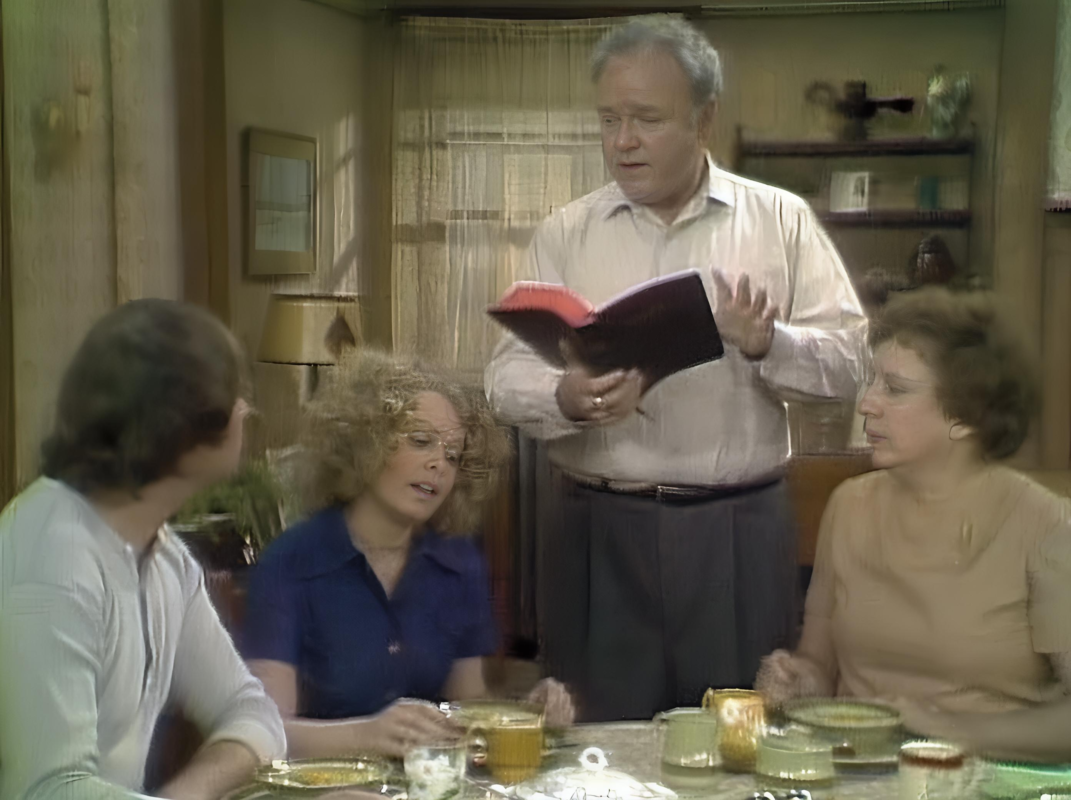
Michael Eric Dyson, a prominent author, academic, and cultural critic, is known for his profound insights into the interplay of race, culture, and politics in America. His perspective on “All in the Family,” a groundbreaking sitcom from the 1970s, offers a nuanced critique of how the show navigated complex social issues through its controversial protagonist, Archie Bunker.
“All in the Family,” created by Norman Lear, was revolutionary for its time, bringing discussions of bigotry, racism, and other societal ills into living rooms across America. The show’s central character, Archie Bunker, was a working-class white man whose prejudiced views were intended to be a satirical portrayal of the ignorance and intolerance prevalent in society. However, Dyson’s analysis reveals both the strengths and limitations of the show’s approach to social commentary.
“Archie Bunker is a reflection of America’s racial tensions,” Dyson might assert. “But the question is whether he serves as a mirror to provoke change or a mask that allows viewers to hide from the uncomfortable truths about racism.”
Dyson would likely commend “All in the Family” for its boldness in tackling issues that were often considered taboo on television. The show’s willingness to confront topics like race, gender, and class head-on was groundbreaking and opened up essential conversations. However, Dyson would also critique the show’s reliance on humor to convey these messages, questioning whether the comedic format undermined the seriousness of the issues being addressed.
“Humor can be a powerful tool for social critique,” Dyson might explain. “But it can also desensitize audiences to the very issues it seeks to highlight. The laughter becomes a buffer, preventing viewers from fully grappling with the harsh realities of racism and bigotry.”
One of Dyson’s primary concerns would be the potential for misinterpretation. While the creators of “All in the Family” intended for Archie Bunker to be a satirical figure whose prejudices were meant to be ridiculed, there was a risk that some viewers might identify with Archie’s views rather than seeing them as a critique. This ambiguity could dilute the show’s impact and perpetuate the very stereotypes it aimed to dismantle.
“Archie Bunker’s character walks a fine line,” Dyson might observe. “For some, he is a cautionary tale; for others, he could become a misguided hero.”
Dyson would also examine the narrative focus of the show. Although “All in the Family” addressed significant social issues, it did so primarily through the lens of a white, male protagonist. This focus, Dyson would argue, might marginalize the experiences and voices of those directly affected by racism and other forms of oppression. The stories of Black characters and other minorities often remained secondary to the narrative arc of Archie’s personal growth and enlightenment.
“The danger lies in centering the oppressor’s journey,” Dyson might argue. “We must ensure that the stories of the oppressed are given prominence and not just used as a backdrop for the redemption of those in power.”
Furthermore, Dyson would likely critique the show’s impact on societal attitudes. While “All in the Family” succeeded in bringing issues of prejudice into mainstream discourse, it also faced the challenge of moving beyond mere conversation to actual change. Dyson would emphasize the importance of actionable outcomes and the role of media in not just reflecting society but actively shaping it for the better.
“Dialogue is essential, but it must lead to transformation,” Dyson would insist. “Media has the power to inspire change, but it must do so intentionally and with a clear commitment to justice.”
In reflecting on “All in the Family,” Dyson’s critique underscores the complexities inherent in using entertainment as a vehicle for social commentary. His insights call for a deeper engagement with the narratives we consume and a critical examination of their broader implications. Dyson’s analysis encourages creators and audiences alike to consider the impact of media on societal attitudes and the importance of responsible storytelling.
As we continue to explore the intersection of race, culture, and media, Michael Eric Dyson’s perspective on “All in the Family” serves as a valuable reminder of the power and responsibility that comes with telling stories that reflect our collective struggles and aspirations. His critique challenges us to strive for media that not only entertains but also educates, empowers, and drives meaningful change.
